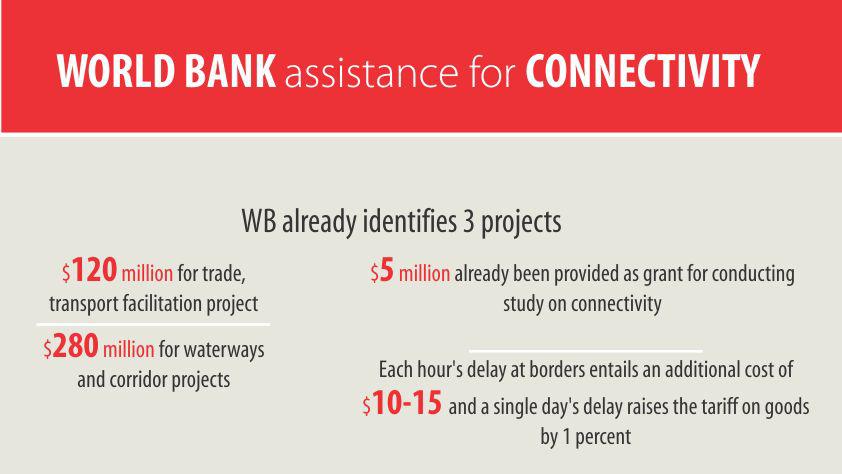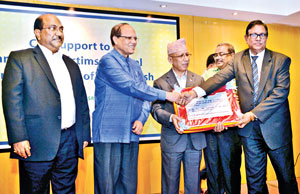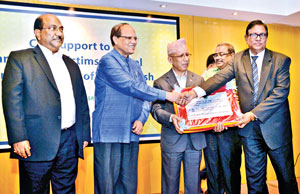The government has increased excise duty on domestic and international air ticket prices and deposits in banks and financial institutions by up to 67 per cent for the next fiscal year.
The government in the budget for FY 2015-16 proposed to increase the excise duty amending the Excises and Salt Act-1944.
The increased excise duty rates have been effective from June 4.
According to the National Board of Revenue, domestic air travelers will have to pay Tk 500 per ticket for single journey instead of the current Tk 300.
For travelling in the countries of South Asian Association for Regional Cooperation, passengers will have to pay Tk 500 per seat which was Tk 300.
Excise duty has also been increased to Tk 1,000 per air ticket for travelling to other Asian countries from the existing Tk 500 and for rest of world to Tk 1,500 per seat from Tk 1,000.
Airlines will collect the duty with air ticket fees.
In a press statement, Biman Bangladesh Airlines said that passengers who had already purchased the ticket without paying excise duty would have to pay the duty at airports before their journey.
On balance in accounts with banks and financial institutes, the excise duty has been increased to Tk 150 per year from Tk 120 if the balance, credit or debit, exceeds Tk 20,000 at any time during a year but less than Tk 1 lakh.
For balance of Tk 1 lakh to Tk 10 lakh, the payable excise duty will be Tk 500 per year which is now Tk 350.
Account holders will have to pay Tk 1,500 per year as excise duty instead of Tk 1,000 for balance of Tk 10 lakh to Tk 1 crore.
For balance ranging from Tk 1 crore to Tk 5 crore, the rate of excise duty has been increased to Tk 7,500 from the existing Tk 5,000 while for balance above Tk 5 crore, account holders will have to pay Tk 15,000 per year as excise duty in next year which was Tk 10,000 in the current year.
Banks and financial institutions usually deduct the duty from the accounts when the balance crosses the limit.
The World Bank could lend more than $1 billion to implement a number of regional connectivity projects for boosting trade and investment among Bangladesh, India, Nepal and Bhutan.
A transport team of the global lender presented its detailed plan to bankroll the connectivity projects to Finance Minister AMA Muhith at the WB headquarters in Washington in April.
“By promoting the regional integration, Bangladesh can become the central hub in the region providing connectivity to the neighbouring countries,” said the presentation.
Besides, a WB team visited several ports, customs points and India-Bangladesh multimodal corridors this year and last year. Following the visits, the team sent an aid memoir to the finance ministry, ministry officials told The Daily Star recently.
They added the WB would finance around $1billion in the next two fiscal years and talks were at final stage about two projects involving around $400 million.
The WB usually provides loan at 0.75 percent interest rate.
At a shipping secretary-level meeting between Bangladesh and India in New Delhi in April, India informed Bangladesh that the WB would provide one-third of the fund for developing water routes for transit of goods, and India and Bangladesh the rest.
During the just-concluded visit of Indian PM Narendra Modi to Bangladesh, several agreements related to transit have been signed. Under the deals, India can use Chittagong and Mongla ports. Several river routes have been identified for multimodal transport.
On Monday, the cabinet approved the draft of Motor Vehicle Agreement among Bangladesh, Bhutan, India and Nepal. Once signed, the deal will allow vehicles to ply designated routes in the four countries.
For the first phase of the Bangladesh Regional Connectivity Project and the Dhaka-Chittagong Inland Waterways Project, the WB has proposed to provide $400 million in the upcoming fiscal year.
Of the sum, $120 million will go to the connectivity project to facilitate trade and transport. It will cut border crossing time at selected border points.
Under the project, the infrastructure, warehousing facilities, transshipment and inspection system, customs control procedure, institutional and regulatory framework would be developed to facilitate smooth functioning of the ports.
New trade routes between Bangladesh and India are being opened in Mizoram and Tripura.
Under the proposed WB-funded project, five land ports have been identified for modernisation for boosting trade of Bangladesh with India. Under this, new land ports will be established at Tegamukh in Rangamati and Ramgarh in Khagrachhari. The project will also develop land ports in Nepal and Bhutan.
One of the components of the project is to further modernise Chittagong Port to increase its capacity.
The modernisation is aimed at smooth clearance of goods at the ports, improving the procedures, infrastructure and systems. Necessary facilities will have to be ensured at the ports so that female traders can participate in cross border trade with ease, according to the aid memoir.
Of the first phase loan, $280 million will go to the Dhaka Chittagong Inland Waterways project aimed at increasing efficiency and reliability of land water transport along the Dhaka-Chittagong corridor.
Under the project, the waterways will be made deeper through dredging to ensure easy transport of transit goods as well as local goods through river routes. It will also develop rail links to connect them with regional corridors.
The second phase of the WB's proposed Bangladesh Regional Connectivity Project will finance investments at Chittagong Port in 2016-17. It also aims to improve inland waterways along the Bangladesh-India bilateral protocol route and road and inland water transport connectivity to Mizoram of India and two other key trading points.
The WB has designed the India Mizoram Roads II Regional Connectivity project to increase transport connectivity along regional trade corridors in the Indian state.
With road transport being the only mode of transport within the state, improvements to the network will reduce freight and passenger transport costs and provide quick and safer access to all parts of Mizoram and to neighbouring states and countries such as Bangladesh and Myanmar.
The WB does not only stand ready to finance the project to make the inter-regional connectivity a reality in order to boost growth and lift millions of people out of poverty. It has also come up with grants.
Already, the lender has given a grant of $5 million to study how to improve connectivity-related infrastructures. It will also provide technical assistance on management of ports, land ports, and inland water transport.
On invitation from the WB, two teams from Bangladesh and India toured Sweden, Norway and Switzerland last year to share lessons and best practices in transit framework, trade facilitation and logistic services.
Cross-border connectivity makes commercial sense too, as each hour's delay in border entails an additional cost of $10-15 and a single day's delay in border raises the tariff on goods by 1 percent, according to the WB.
News:The Daily Star/10-Jun-2015






